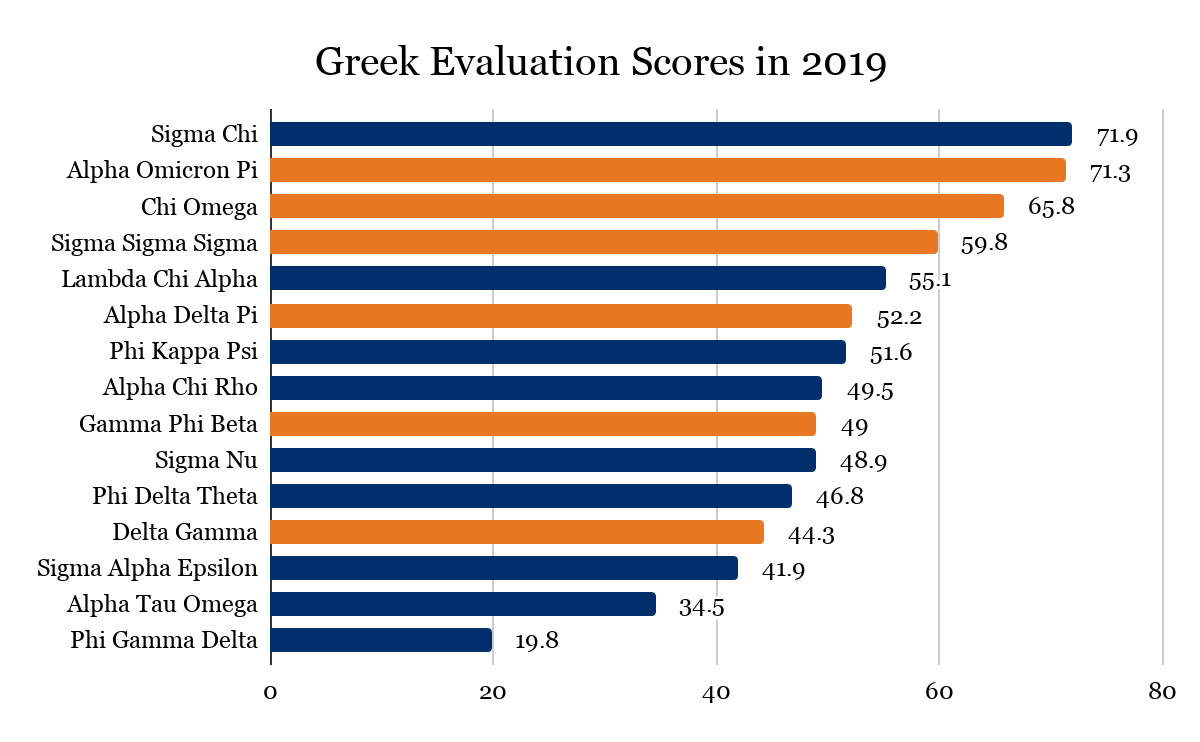2019 Greek Evaluations: New Review Process Suggests Overall ‘Satisfactory’ Performance of Fraternities and Sororities
By Katie Oglesby, News Editor
While evaluating sororities and fraternities on the Gettysburg College campus dates back to 1998, a committee created in 2013 was responsible for implementing the groundwork for our current rubric and evaluation process. 2019 also marked a change in the evaluation process — in previous years scores were out of 500 points, but this year, they were out of a weighted 100. Chapters’ scores are reflective of academic achievement and intellectual engagement, member recruitment and retention, community engagement, and organizational management.
The release of the 2019 Greek Evaluation Reports revealed that the vast majority of Greek organizations received scores deemed ‘satisfactory’ by the Greek evaluation panel. Alpha Tau Omega had the lowest ‘satisfactory’ score of 34.5 out of 100, while Chi Omega achieved the highest ‘satisfactory’ score of 65.8. Two Greek organizations received ‘above average’ scores according to the current rubric: Alpha Omicron Pi, a sorority, and Sigma Chi, a fraternity.
In 2018, Sigma Chi was also the only fraternity to score ‘above average.’ Five of the six sororities (including Alpha Omicron Pi) had also achieved ‘above average’ in 2018. This year, the only sorority to achieve ‘above average’ was Alpha Omicron Pi. So, while the majority of sororities scored higher than the majority of fraternities in 2018, this disparity seemed to disappear in 2019. Whether or not this change is due to the new review process remains unclear.
In Sigma Chi’s report, the College noted that, “it is clear that this is a very high performing chapter and they should be commended for that. The chapter should aim to continue operating at this level for years to come.”
“We strive to set an example of the many positive contributions Greek Life makes to its members and to the campus community writ large,” said President of Sigma Chi, Justin Letizia ‘21. “Our ability to excel in the evaluation is a testament to our strong, motivated, and inclusive brotherhood, constituted of men who pride themselves on being upstanding students of Gettysburg College and who represent Sigma Chi well in all areas of campus.”
With an ‘above average’ score of 71.3, the Alpha Omicron Pi sorority was praised for its organization management, leadership, relationships with advisors, and panel presentation. Evaluators recommended working on documentation, especially as it pertained to recruitment.
Phi Gamma Delta was the only Greek organization to receive a score deemed ‘underachieving’ by the evaluation panel in 2019. In 2018, Phi Gamma Delta had received a ‘satisfactory’ score.
According to the report, the panel challenged “[Phi Gamma Delta] to define what the right direction for their organization is and ensure it aligns with their values and the values of Gettysburg College. Once this vision for the future is developed, the leadership must make sure it is infused into all of the work being done by the chapter at all levels.”
Phi Gamma Delta did not respond to a request to comment.
“[The evaluation process] helps each organization set tangible goals for the year and improve over time,” said Letizia. “It quantifies our organizations in a standardized way that hopefully demonstrates why Greek Organizations are an important and essential aspect of the Gettysburg experience.”
The evaluation process is designed to help Greek organizations pinpoint how they need to improve, but if scores are consistently ‘satisfactory,’ then it may be more challenging to understand what changes must be made in order to see tangible improvements.
According to the Director of Student Activities and Greek Life, Jonathan Allen, “[the panel] made significant changes to the process this year to better align the criteria with institutional priorities, raise expectations, simplify the scoring system, and provide more opportunities for chapters to discuss their successes and areas of improvement outside of the context of the provided rubric.”
“It was clear that the organizations are very proud of the work they are doing but also recognize there is more to be done,” said Allen. “The chapters understand many of the major issues facing the community and are committed to finding new ways to address them.”


September 10, 2020
Do you have a link to the report itself and the actual guidelines and factors that go into scoring?